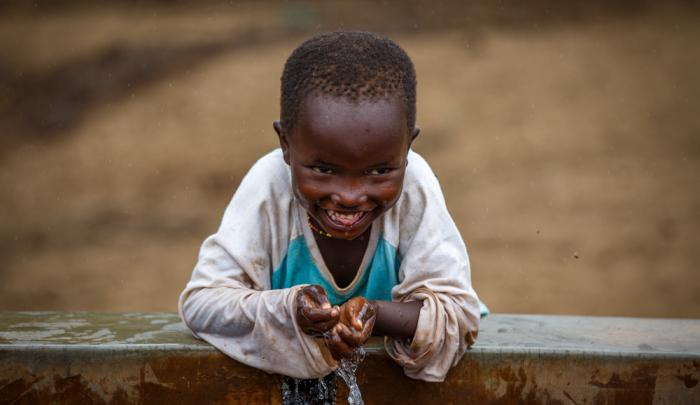
CHAPEL HILL, N.C. (October 10, 2016) - This week, World Vision is announcing a multi-year partnership with the Water Institute at the University of North Carolina at Chapel Hill. The partnership is designed to improve water, sanitation and hygiene interventions in low- and middle-income countries with the ultimate goal of helping solve the global water and sanitation crisis by 2030.
The partnership is unique in that few partnerships exist between NGOs and research institutions to use data and evidence at this scale to inform program improvements. It builds on long-standing partnerships that World Vision has already established with organizations like the Conrad Hilton Foundation, which has provided funding for water and sanitation programs throughout Africa.
“World Vision is committed to working with our partners to provide sustainable clean water and sanitation to everyone everywhere we work, and in order to fulfill this vision, we need to improve our approach – doing some things differently and many things more efficiently,” said Dr. Greg Allgood, vice president of water at World Vision. “Our partnership with the Water Institute at the University of North Carolina will provide data and lessons learned allowing us to improve at an unprecedented scale.”
“World Vision and The Water Institute at UNC share two important things – a desire to make a real, substantive difference and a willingness to learn and improve,” says Water Institute Director Jamie Bartram, PhD, Don and Jennifer Holzworth Distinguished Professor in the UNC Department of Environmental Sciences and Engineering. “This partnership builds on those common values to deliver more impact more sustainability and more back for the buck from the things World Vision is already doing well today; and to learn lessons important to implementers worldwide.”
The collaboration includes two completed studies and five current and future studies that will drive improvements to World Vision’s clean water and sanitation programs.
Completed studies reveal some dramatic successes and areas for improvement so far, including the following:
- A study to determine the long-term functionality of wells and other water points, funded by the Hilton Foundation, showed that nearly 80 percent of World Vision’s wells in Ghana’s Greater Afram Plains were still operational after two decades.
- A baseline evaluation in 10 sub-Saharan African countries conducted in 2014 showed that:
- 62 percent of households, 76 percent of schools and 86 percent of health facilities in World Vision’s program areas had year-round access to an improved water source providing clean water.
- 67 percent of households in World Vision’s program area had some type of sanitation facilities. At the same time, only 26 percent had access to improved sanitation facilities, indicating a need for greater focus on helping families improve the sanitation of their homes.
- Each year, World Vision’s impact continues to grow. In 2010, World Vision reached 200,000 people with clean water. In 2015 alone, the organization reached 2.3 million people.
Moving forward, the UNC Water Institute will an additional five rigorous evaluations of World Vision’s water, sanitation and hygiene programming in at least 10 countries. These studies will provide midline (2017) and final evaluations (2020) of World Vision’s programming in the 10 countries where the baseline occurred.
Additional studies will examine the following:
- best practices for the development of water committees, local groups that manage water quality and the maintenance of wells and other water points within individual communities;
- factors that contribute to the sustainability of solar-powered water systems
- adapting Continuing Quality Improvement (CQI) programs, which have driven rapid improvement in the manufacturing, service and health care industries, to the water and sanitation sector.
A potential new baseline evaluation may take place in up to four additional countries.
Currently, World Vision provides clean water to one new person every 30 seconds. By the release of the final report in 2020, the organization hopes to be providing clean water and sanitation to one new person every 10 seconds. Data and lessons learned from these studies will help shape efforts through 2030, by which time World Vision expects that, in collaboration with their partners, they will have provided universal access to water and sanitation in all program areas worldwide.
– END –
About World Vision:
World Vision is a Christian humanitarian organization dedicated to working with children, families, and their communities worldwide to reach their full potential by tackling the causes of poverty and injustice. World Vision serves all people regardless of religion, race, ethnicity, or gender. For more information, please visit www.WorldVision.org/media or follow on Twitter @WorldVisionUSA.
About The Water Institute
The Water institute at the University of North Carolina at Chapel Hill is a leader in monitoring, evaluation and continuous quality improvement in water, sanitation and hygiene programming. Through research, teaching and learning, knowledge management, and networking and partnerships, to work toward eliminating global disparities and improving access to safe water for all.
Highlights
- Six-year partnership will provide data-driven improvements to World Vision’s clean water and sanitation programs.
- Partnership will include seven rigorous studies in as many as 14 countries.
- World Vision provides clean water and sanitation to one new person every 30 seconds.
- By 2030, World Vision hopes to provide universal access to clean water and sanitation to all of its program areas worldwide.